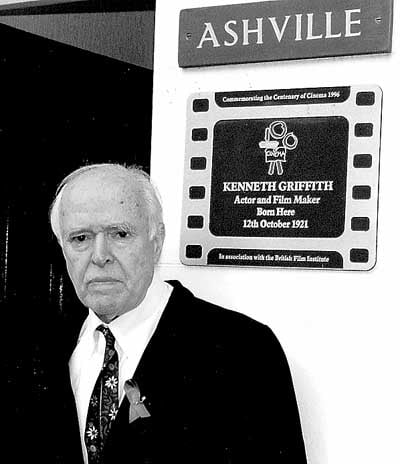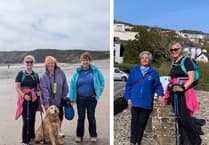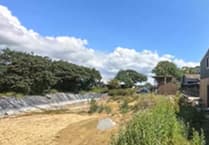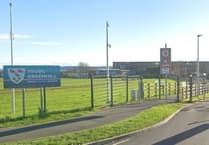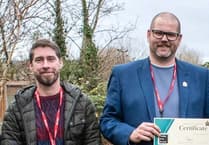The last time I saw Ken was in the autumn of 2005. He was staying in his beloved Tenby and a friend drove him out to Amroth to call on us. When he left I knew I would not see him again. He was frail and deteriorating, and it was heart-breaking to see him trying to hold the cup in his two hands as he slopped his tea. But I knew that his hands had trembled slightly even in his boyhood when, as an embryo actor, he held a script Yes, he had the regulation green-and-white ribbon in his lapel. The formality of the greetings and theatrical hugging and two-cheek kiss over and done with, he sat down and launched into his customary tirade on the history of England's deplorable treatment of Ireland's peasantry for more than seven centuries. As he had once said, it was not a case of the Irish Question but the English Question. So I said yes, I had travelled west in Ireland as far as the Blaskets, had read every book on the history of those island people, had read the books of Walter Macken, and had listened to the stories of my old friend Wally McGrath, the fine Irish writer who had accompanied the last boatload of the Great Blasket people when they were evacuated from the island, so let us talk about something else. Now that I come to write this appreciation it is hard to believe how our paths crossed occasionally over the years, the coincidences, even before we were born, and how much we had in common. I have no intention of enumerating his vast and well- chronicled achievements in the worlds of theatre, film and television, which brought him fame. Because of that fame, in recent years he was invited as the honoured guest at some reunion or other of the Tenby Grammar School's former pupils, and he shocked many of the assembled gathering with his customary observations on Ireland. When some of those present told me how disgraceful they thought it was I told them it was their own fault for inviting him. They had invited him because he was famous, and they should have expected him to talk about one of the crusades for which he had become so famous. More recently perhaps it has been Ireland, but let us not forget his tremendous work in India and Africa. In his autobiography, which he began to write when he was in Africa, he referred to his ancestry and said, 'Ernest, my paternal grandfather, was a stonemason by trade, and let it be understood, a very fine one. He was the son of Edmund Griffiths who was also a stonemason and the family home was at "The Square", Stepaside, Pembrokeshire. Why the little house was called "The Square" I don't know and at this moment I am sitting in a small town named Knysna on the south-eastern tip of Africa and very far from my old friend Roscoe Howells who is an historian living in Pembrokeshire, and who probably knows.' I would not claim to be an historian, but I know a bit about this area, and I was certainly able to tell Ken why the house which Edmund built, and where he lived, had been called the Square, as it is still known, except that the full name is The Square and Compass, which were tools of the stonemasons' trade. I was also able to tell him that Edmund had been born at Hill Top not far away. Of recent years I went there with Ken and took his picture standing by the substantial remains of the old house. The current owner, Elfed Wilkins, a native of Amroth parish, had recently applied for planning consent to rebuild it for the use of one of his family. The Ayatollahs of our great National Park, however, found sufficient reasons to turn the application down when, had they known anything of the history of the area in which they hold sway, it should have been rebuilt and designated with a plaque. One of Edmund's sons, Ernest, became a builder in Tenby, and it was his son, Harold, who was Ken's father. He and his wife made a disastrous marriage, separated, and Ken was abandoned when he was six months old. That was in Church Park, where Ken was born in October 1921. Ernest and his wife, Emily, took Ken in and reared him. Understandably Ken revered their memory until the day he died. Then came the depression of the 1920's. Ernest, like many others, struggled on bravely for as long as he could until he went bankrupt. My father, too, was a builder and I was old enough to understand something of the financial worry. Ken once told me of his terrible memories, almost beyond the understanding of an eight-year-old child, not merely of being turned out of their home, but of seeing the bailiffs putting out into the street precious bits of furniture which had not already been sold in a brave but forlorn attempt to survive. Yes, he had great sympathy for the Irish peasantry. Various neighbours did what they could to help, but Ken always remembered that, although Ernest had been prominent amongst the Freemasons, they were conspicuous by their absence in this hour of need. He had good reasons for being anti- establishment in many walks of life. Amongst people of cherished memory, however, were Herbert Walker, the foreman at Ace's garage, and his family, who lived in Harding Street, and who took them in for a brief spell until Ernest found a place to rent and was later able to move to Penally. One of the Walkers' four children was nine-year- old Connie. We were in the same class in school. Some years ago when I was doing a farm report in Devon I was able to call on her and her husband. There was much reminiscence, and Connie told with great amusement how, when Ken had become famous, she had shocked her friends by saying that she had slept with him. When the truth was told they agreed that for a pair of eight-year-olds that was fairly harmless. Widowed and childless, Connie died in a nursing home in June, a couple of weeks before Ken. Ken knew nothing of the parentage of his grandfather Edmund, but knew that he had a pension or allowance to the end of his days from some estate or other so assumed that he had been born the 'wrong side' of the blanket, but people didn't talk about that sort of thing in those days. His mother was Esther of Hill Top, a single girl in domestic service. It was when Ernest was in Penally, about 1929, that I came to know Ken, when I went to Tenby Council School, so perhaps I should tell something of the backgrounds of both our families. My mother died in childbirth when I was born and my sister was five years old. I have many memories of how, when I was a child, kind ladies, whom I did not know, would speak to me and tell me that they had taken me in and looked after me when I was a baby, so I had that much in common with Ken. I was far luckier than he was, however, because when I was 10 months old my father married again and my stepmother was marvellous to me. I never knew her or referred to her as other than my mother, and that is how I will refer to her here. I grew up and have remained close to her family all my life and still value them as my own. Her mother was one of the 16 children of the miller, Walter Evans of Heronsmill, a smallholding and mill upstream from the Square on what is known as Fords Lake. She married a man by the name of Jimmy Lloyd, a forester on the Picton Estate who, like his great friend Edmund Griffiths, had been born the wrong side of the blanket. Edmund built the house in which the Lloyds lived. The mother died young, leaving five children under the age of 14. There was one boy, Edwin, who at the age of 14, turned on the teacher at Stepaside School who was about to cane him, gave him a hammering and ran home. It was the end of his schooldays. The teacher was Wilfred Lewis, better known as 'Biff'. Wilfred Lewis lived at the Square, married to Polly, the sister of Ken's grandfather Ernest. By the time I started school in my native Saundersfoot Biff was a teacher there. He was all right to me, but my mother was convinced that he would take it out on me because of what had happened with her brother Edwin, so as soon as I moved up into Biff's class she went into Tenby to see the legendary Ossie Morgan, who had just become the young headmaster of the Council School and he agreed for me to start there. That was in 1929. What she could be forgiven for not knowing was that there was a young cane-wielding sadistic fiend there by the name of Ensor Morgan. Read Ken's autobiography for fuller details. Ken's solution, in desperation, when he had been reduced to a nervous wreck, was for Ernest to have a talk to headmaster Ossie and the caning stopped. My answer a year earlier had been to get on my bike in the dinner hour and ride home to Saundersfoot. Father had a word with Ossie, and in my case, too, the caning stopped. Typically, in his autobiography, Ken gave credit where it was due and said that Ensor really taught us something. A case, no doubt, in the words of Ken's beloved Shakespeare, of 'The evil that men do lives after them, the good is oft interred with their bones.' Perhaps today's so-called education might be better if teachers had at least a bit of the freedom that Ensor had. It was not until 1931 or '32 that school dinners were introduced, at a charge of four pence per head. Up to that time the 'country' children carried their own food. The town children went home. I was the only one from Saundersfoot, but there were others from Penally, Manorbier, Gumfreston, New Hedges and one or two other outposts, where there were schools, but no doubt attracted by the steadily increasing reputation of Ossie Morgan. There was great camaraderie between us. Something of which I was not conscious was that, because of the ignominy of having been turned out onto the road, Ken was often made fun of and picked on by some of them, more especially perhaps by some of the town children. It was only in later years, when we met again and reminisced, that Ken said he had always been grateful to me because I had always 'stuck up for him', but I had never been conscious of this. More than once in life people have spoken to me and said that Ken thought well of me, and I never knew of any particular reason why he should, but there would seem to have been other reasons, of which I was unaware. Ken had apparently had to struggle academically to pass the entrance exam to Greenhill County School, whereas two years previously I had won a scholarship to Christ College, Brecon. It also so happened that he was never able to swim, whereas in my last year in the Council School I had saved two people from drowning and been awarded the life saving certificate of the Royal Humane Society. In September of that year our ways parted. Then, in 1938, Ken made his first professional appearance with a repertory company at the old Super Cinema in Tenby in the play Night Must Fall. History is mercifully silent on the subject, but I also appeared in that play. How on earth that came about I shall never know. Although in later years I did a fair bit in concert party, I would never have made a straight actor in a hundred years. It was the smallest of walk-on parts, with only six words to say, but nobody could say I muffed them because I was assured afterwards that they could not be heard further back than the third row. I never saw Ken in another play until by another coincidence, having seen him in his first, I was also to see him in his last, something like 40 years later, and that was in Cause Célèbre at His Majesty's Theatre in London. Appropriately named theatre for the occasion perhaps, because my wife and I had been invited that year to one of the garden parties at Buckingham Palace along with the late Mary Griffiths, a legendary character in the life of Pembrokeshire. Not only did we go to see the play, but went round backstage afterwards to have a great reunion with Ken in his dressing-room where his joy to greet us was memorable. He told me then how relieved he was that he had arranged for his participation to be limited, and how he was looking forward to going back to and concentrating on the work he really wanted to do. After that first professional play in Tenby we met again about 1944. My wife and I had a small farm at a little place called Langley, near Stratford-on- Avon, and I had to go to the doctor's surgery there. To our mutual amazement, who else should be there that day but Ken. He had not long been invalided out of the RAF and was obviously a very sick young man. It was as natural as night following day that it was arranged for him to call on us. A day or two later he came by 'bus to Bearley Cross where I met him with a pony and trap. He had a welcome meal, and when he departed in the bitterly cold weather I lent him my overcoat. I had it back later but cannot remember how it came about. During the war both his well-loved grandparents had died, so that he was now homeless, and he told us then that he been taken in by a family in Stratford where the daughter had been wonderfully kind to him, and it was no surprise in later years to learn that they had married. As far as I remember it must have been another 30 years before we met again. It was in the early 1970's when I heard that he was staying in Tenby, 'somewhere down by the harbour', and I called on him. By that time he had been married and divorced for the third time and his companion was a lovely lady, Maggie Kopala. Amongst other things he was intrigued to know that I was trying my hand at a novel, and even more so that it was set in the valley of Fords Lake and was to be entitled 'Heronsmill'. He wanted to see as much as I had written and in his typical enthusiasm said, 'This must be published! I'll introduce you to my friend Tony Whittome at Hutchinson and it will have a fair criticism.' Here again we had much in common. Like Ken, I found Tony to be a splendid fellow, but Ken and I were both quick to recognise the truth of the well- worn adage, 'Great fleas have little fleas upon their backs to bite 'em. And little fleas have lesser fleas, and so ad infinitum.' The novel, my first, was duly published in 1979, and I mention it here only because it explains why I was in touch with Ken occasionally whenever I was in London during those years. During the first week of December, 1975, I was in London for the Smithfield Show, and on the Tuesday evening I went out for supper to Ken and Maggie. They were living in Maggie's flat in Notting Hill, in the Portobello Road. Apart from any such thought as old time friendship, the purpose was also to discuss progress with the novel. Ken, however, was obviously depressed and very worried, and he told me then of his fight with Lew Grade over the suppression of his film about Michael Collins. Although he had been advised by his legal people that he had a sound case, he knew that if it went against him he would be ruined. He had little enough by way of money, and no great possessions. The costs, however, if the judgement went against him, would be massive and a millstone round his neck for the rest of his life. He was seriously wondering whether he could dare to go on with it, but he was a fighter. Perhaps heartened by his Shakespeare, 'This above all; to thine own self be true and it shall follow as the night the day, thou canst not then be false to any man.' Truth can often be stranger than fiction. The following evening, which was December 3, 1975, I went to the Ritz for a party given by the Milk Marketing Board, typical of the events arranged for the press, broadcasting and publicity people when the Dairy and Smithfield Shows in those days were held in London. I have no record or recollection of any of the people with whom I was talking, but I remember distinctly that milk, if any, was by no means the only beverage on offer. In fact I remember thinking that I was glad I did not have to drive at the close of the proceedings, when I picked up the conversation of the little group close by, and in 10 seconds flat I was stone-cold sober. They were television characters, talking about Ken's possible forthcoming case against Lew Grade. The man who was talking was evidently close to the affair and well-informed. He said that Grade knew the case would probably go against him, but he was equally confident that Griffith could never dare to go through with it because Grade could ruin him. And Grade would take him right up the court steps to the very door, and only then would he think of settling. He knew that Griffith could not dare to go that far. I rang Ken the next morning at about seven o'clock, and he found it hard to believe at first, but it gave him tremendous encouragement. The rest is history. Grade settled out of court, plus all of Ken's considerable costs, with a condition that the figure must never be disclosed. Ken was very close about his own financial affairs anyway. Suffice it to say that shortly afterwards Ken bought a house in the then fashionable Islington, and it seemed like some sort of poetic justice to call it Michael Collins House. He lived there for the rest of his days, and it was the house in which he died. One last little memory of which I would tell speaks volumes for Ken's complete professionalism. It was probably in the spring or summer of 1978. He was staying, as usual, in Tenby. His little daughter, Eva, was with him and, interested to see something of the beloved haunts of her father's childhood, I took them to the Square and Heronsmill. There was no- one to take the service at the chapel in Amroth that evening and would I do it. Having just accepted that commitment I asked Ken if he would read the lesson. He had often told me how nervous he had been before going on stage, which was one reason why he gave up the theatre eventually to concentrate on his documentary films. We came home to tea and Ken began to prepare for the ordeal of reading a passage from the Gospel according to St. Luke in a little seaside chapel with a congregation of fewer than 20 people. For more than an hour he read the passage over and over again. However nervous he may have been when the time came, it was a reading that evening of simple dignity and sincerity, and I saw more than one tear in a few of the eyes. Members afterwards found it hard to believe that he could have rehearsed it so thoroughly. Those who did not know him said he was a Marxist and goodness only knows what else besides. He was merely anti-establishment and deplored the damage done to the country by the trade unions and particularly how the Lefties had taken over the BBC. Odd? Idiosyncratic? Yes, maybe, and much besides. But of great integrity, honest and with unbelievable courage. Happiest thought of all was that he had five children whom he loved and who loved him in return, and that must have meant much to one whose own childhood had been so traumatic. Roscoe Howells
